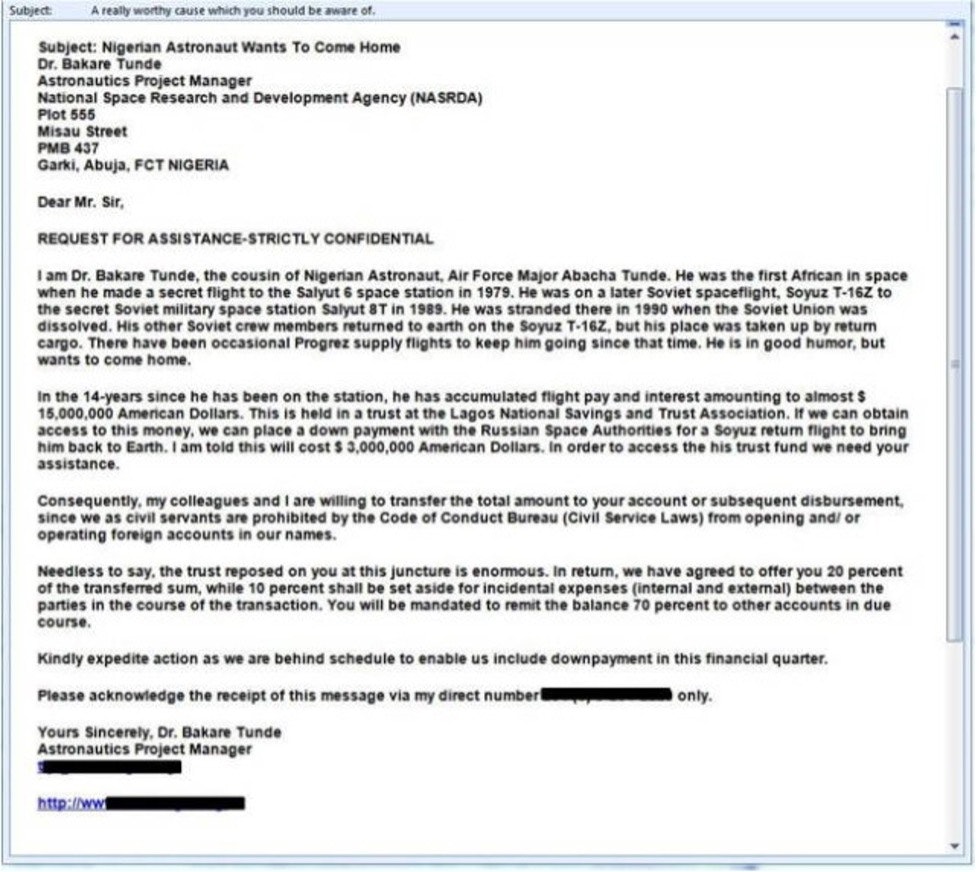Let's talk about the Nigerian prince – the mysterious figure behind one of the most infamous scams in modern history. You've probably received an email or two from someone claiming to be a Nigerian prince in desperate need of your help. But who exactly is this elusive character, and why has the "Nigerian prince" become such a pop culture phenomenon? Buckle up, because we're diving deep into the story behind the scam that’s been fooling (and entertaining) people for decades.
Now, I know what you're thinking – is this even real? Well, the Nigerian prince isn't exactly a single person. Instead, it's a persona created by scammers to prey on unsuspecting victims. But the story behind the scam is fascinating, and it’s worth exploring how this scheme became so iconic. So, let's break it down and figure out why everyone’s talking about this "prince" who keeps asking for money.
Before we dive deeper, let's get one thing straight: the Nigerian prince scam isn't just some random internet joke. It's a real problem that affects thousands of people worldwide. But don’t worry, we’ll cover everything from its origins to its impact, and even give you some tips on how to avoid falling for similar scams. Ready to learn more? Let’s go!
Read also:Whatrsquos Trending In 2024 A Deep Dive Into The Future
The Origins of the Nigerian Prince Scam
So, where did this whole "Nigerian prince" thing come from? Believe it or not, the scam has been around way longer than the internet. Back in the day, scammers used letters and telegrams to reach potential victims. But when the internet came along, things got a lot easier for them. Suddenly, they could send out thousands of emails with just a few clicks.
Here's the basic idea: you receive an email from someone claiming to be a Nigerian prince (or some other high-ranking official). They say they’re in trouble and need your help to transfer a large sum of money out of the country. In return, they promise to give you a hefty reward. Sounds too good to be true, right? That's because it is. These scammers are just trying to trick you into sending them money or personal information.
How the Scam Works
Let me break it down for you. The Nigerian prince scam usually follows a simple pattern:
- Step 1: You receive an email from a supposed "Nigerian prince" or government official.
- Step 2: The sender claims to have access to millions of dollars but needs your help to transfer the money.
- Step 3: They ask you to send them a small amount of money upfront to cover "processing fees" or "legal costs."
- Step 4: Once you send the money, they disappear, leaving you high and dry.
It's a classic case of "if it sounds too good to be true, it probably is." But despite its simplicity, the scam has managed to fool countless people over the years. So, why does it work? Keep reading, and we’ll get into that.
Why Does the Nigerian Prince Scam Still Exist?
Here's the thing – the Nigerian prince scam is old news. Most people know about it, and many of us have even laughed at the absurdity of it. But surprisingly, it’s still around today. Why? Well, there are a few reasons:
- First, scammers are constantly evolving their tactics. While the basic premise remains the same, they tweak the details to make the scam seem more believable.
- Second, there are always new people online who haven’t heard of the scam before. As the internet grows, so does the pool of potential victims.
- Finally, some people are just desperate. If you’re struggling financially, the promise of a quick windfall can be hard to resist.
It's a sad reality, but the Nigerian prince scam continues to thrive because there are still people out there who fall for it. And as long as there are scammers willing to exploit that vulnerability, the scam will keep going.
Read also:Chris Isaak Illness The Untold Story Behind The Legend
Who Are the Scammers Behind the Nigerian Prince?
Now, you might be wondering – who are these people sending out all these emails? Are they really from Nigeria? The answer is… complicated. While the scam is often associated with Nigeria, it’s not exclusive to the country. In fact, scammers from all over the world have been known to use the "Nigerian prince" persona.
That said, Nigeria has become a hotspot for cybercrime. According to a report by the United Nations Office on Drugs and Crime (UNODC), Nigeria ranks among the top countries for internet fraud. But it’s important to remember that the vast majority of Nigerians are hardworking, honest people who have nothing to do with these scams. Don’t let the actions of a few bad actors tarnish your perception of an entire nation.
The Psychology Behind the Scam
So, why do people fall for the Nigerian prince scam? It all comes down to psychology. Scammers are experts at exploiting human emotions and weaknesses. Here are a few reasons why the scam works:
- Appeal to Greed: The promise of easy money is incredibly tempting, especially if you’re struggling financially.
- Creating Urgency: Scammers often claim that the opportunity is time-sensitive, which pressures victims into acting quickly without thinking things through.
- Gaining Trust: By pretending to be a high-ranking official or royalty, scammers make themselves seem more credible.
It’s a clever combination of tactics that plays on our desires and fears. And while most of us can spot the scam a mile away, others aren’t so lucky. That’s why it’s crucial to educate yourself and others about how these scams work.
Real-Life Examples of the Nigerian Prince Scam
Believe it or not, there have been some pretty wild stories involving the Nigerian prince scam. Here are a few examples:
- In 2018, a group of scammers in Nigeria was arrested after defrauding victims of millions of dollars. They used fake emails and websites to impersonate government officials and business executives.
- One victim reportedly sent over $100,000 to scammers who claimed to be Nigerian princes. By the time he realized he’d been duped, it was too late.
- In another case, a scammer posed as a Nigerian prince and convinced a woman to send him her life savings. She even traveled to Nigeria to meet him, only to discover that he was a complete stranger.
These stories might sound outrageous, but they’re all too real for the victims involved. It’s a harsh reminder of how dangerous these scams can be.
How to Spot a Nigerian Prince Scam
Alright, let’s get practical. How can you tell if you’re dealing with a Nigerian prince scam? Here are a few red flags to watch out for:
- The email is poorly written with lots of spelling and grammar mistakes.
- The sender claims to be a prince, government official, or someone in a position of power.
- They ask for money upfront to cover "fees" or "expenses."
- The promise of a large reward seems too good to be true.
If you notice any of these signs, delete the email immediately and don’t reply. Trust me, it’s not worth the risk. And if you’re ever unsure, do some research or consult with someone you trust before taking any action.
What to Do If You’ve Been Scammed
Unfortunately, falling for a Nigerian prince scam happens more often than you’d think. If you’ve been scammed, here’s what you should do:
- Report the scam to local authorities and online platforms like the FBI’s Internet Crime Complaint Center (IC3).
- Contact your bank immediately to see if they can reverse the transaction.
- Change your passwords and enable two-factor authentication to protect your accounts.
It’s not easy admitting you’ve been scammed, but taking action quickly can help minimize the damage. And remember, you’re not alone – thousands of people fall for these scams every year.
Preventing Future Scams
Now that you know how the Nigerian prince scam works, let’s talk about how to protect yourself in the future. Here are a few tips:
- Be skeptical of unsolicited emails or messages, especially if they promise money or rewards.
- Don’t click on links or download attachments from unknown senders.
- Never send money to someone you don’t know, no matter how convincing their story seems.
Staying vigilant is key to avoiding scams. Trust your instincts – if something feels off, it probably is. And don’t be afraid to ask for help if you’re unsure about a situation.
Educating Others About Scams
One of the best ways to fight scams is by spreading awareness. Talk to your friends and family about the dangers of online fraud, and encourage them to stay informed. The more people know about scams like the Nigerian prince, the less likely they are to fall victim to them.
There are also plenty of resources available online that can help you learn more about cybercrime prevention. Check out websites like the Federal Trade Commission (FTC) or the National Cyber Security Alliance for tips and advice.
Conclusion: The Nigerian Prince Scam – A Cautionary Tale
So, there you have it – the story behind the infamous Nigerian prince scam. While it might seem like a harmless joke to some, it’s a very real problem that affects thousands of people every year. By understanding how the scam works and taking steps to protect yourself, you can avoid becoming a victim.
Remember, the key to staying safe online is staying informed. Don’t let scammers trick you into giving away your money or personal information. And if you ever receive an email from a supposed Nigerian prince, just hit delete and move on with your day.
Now, it’s your turn. Share this article with your friends and family to help spread awareness about the Nigerian prince scam. And if you’ve got any stories or tips of your own, leave a comment below – we’d love to hear from you!
Table of Contents
- The Origins of the Nigerian Prince Scam
- How the Scam Works
- Why Does the Nigerian Prince Scam Still Exist?
- Who Are the Scammers Behind the Nigerian Prince?
- The Psychology Behind the Scam
- Real-Life Examples of the Nigerian Prince Scam
- How to Spot a Nigerian Prince Scam
- What to Do If You’ve Been Scammed
- Preventing Future Scams
- Educating Others About Scams


